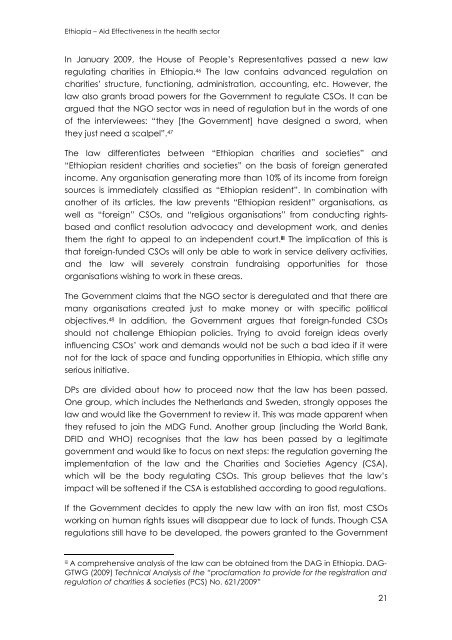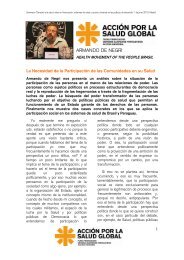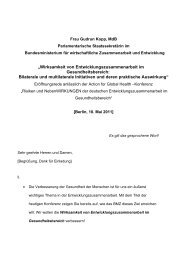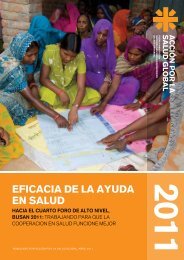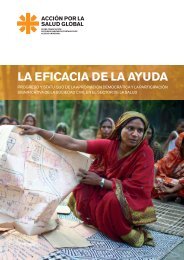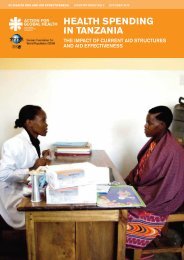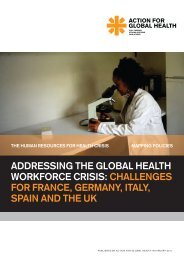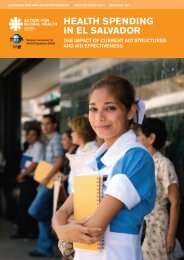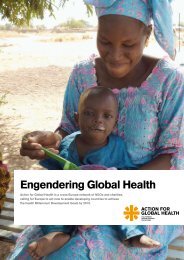Ethiopia Aid effectiveness in the health sector - Action for Global ...
Ethiopia Aid effectiveness in the health sector - Action for Global ...
Ethiopia Aid effectiveness in the health sector - Action for Global ...
Create successful ePaper yourself
Turn your PDF publications into a flip-book with our unique Google optimized e-Paper software.
<strong>Ethiopia</strong> – <strong>Aid</strong> Effectiveness <strong>in</strong> <strong>the</strong> <strong>health</strong> <strong>sector</strong><br />
In January 2009, <strong>the</strong> House of People’s Representatives passed a new law<br />
regulat<strong>in</strong>g charities <strong>in</strong> <strong>Ethiopia</strong>. 46 The law conta<strong>in</strong>s advanced regulation on<br />
charities’ structure, function<strong>in</strong>g, adm<strong>in</strong>istration, account<strong>in</strong>g, etc. However, <strong>the</strong><br />
law also grants broad powers <strong>for</strong> <strong>the</strong> Government to regulate CSOs. It can be<br />
argued that <strong>the</strong> NGO <strong>sector</strong> was <strong>in</strong> need of regulation but <strong>in</strong> <strong>the</strong> words of one<br />
of <strong>the</strong> <strong>in</strong>terviewees: “<strong>the</strong>y [<strong>the</strong> Government] have designed a sword, when<br />
<strong>the</strong>y just need a scalpel”. 47<br />
The law differentiates between “<strong>Ethiopia</strong>n charities and societies” and<br />
“<strong>Ethiopia</strong>n resident charities and societies” on <strong>the</strong> basis of <strong>for</strong>eign generated<br />
<strong>in</strong>come. Any organisation generat<strong>in</strong>g more than 10% of its <strong>in</strong>come from <strong>for</strong>eign<br />
sources is immediately classified as “<strong>Ethiopia</strong>n resident”. In comb<strong>in</strong>ation with<br />
ano<strong>the</strong>r of its articles, <strong>the</strong> law prevents “<strong>Ethiopia</strong>n resident” organisations, as<br />
well as “<strong>for</strong>eign” CSOs, and “religious organisations” from conduct<strong>in</strong>g rights-<br />
based and conflict resolution advocacy and development work, and denies<br />
<strong>the</strong>m <strong>the</strong> right to appeal to an <strong>in</strong>dependent court. iii The implication of this is<br />
that <strong>for</strong>eign-funded CSOs will only be able to work <strong>in</strong> service delivery activities,<br />
and <strong>the</strong> law will severely constra<strong>in</strong> fundrais<strong>in</strong>g opportunities <strong>for</strong> those<br />
organisations wish<strong>in</strong>g to work <strong>in</strong> <strong>the</strong>se areas.<br />
The Government claims that <strong>the</strong> NGO <strong>sector</strong> is deregulated and that <strong>the</strong>re are<br />
many organisations created just to make money or with specific political<br />
objectives. 48 In addition, <strong>the</strong> Government argues that <strong>for</strong>eign-funded CSOs<br />
should not challenge <strong>Ethiopia</strong>n policies. Try<strong>in</strong>g to avoid <strong>for</strong>eign ideas overly<br />
<strong>in</strong>fluenc<strong>in</strong>g CSOs’ work and demands would not be such a bad idea if it were<br />
not <strong>for</strong> <strong>the</strong> lack of space and fund<strong>in</strong>g opportunities <strong>in</strong> <strong>Ethiopia</strong>, which stifle any<br />
serious <strong>in</strong>itiative.<br />
DPs are divided about how to proceed now that <strong>the</strong> law has been passed.<br />
One group, which <strong>in</strong>cludes <strong>the</strong> Ne<strong>the</strong>rlands and Sweden, strongly opposes <strong>the</strong><br />
law and would like <strong>the</strong> Government to review it. This was made apparent when<br />
<strong>the</strong>y refused to jo<strong>in</strong> <strong>the</strong> MDG Fund. Ano<strong>the</strong>r group (<strong>in</strong>clud<strong>in</strong>g <strong>the</strong> World Bank,<br />
DFID and WHO) recognises that <strong>the</strong> law has been passed by a legitimate<br />
government and would like to focus on next steps: <strong>the</strong> regulation govern<strong>in</strong>g <strong>the</strong><br />
implementation of <strong>the</strong> law and <strong>the</strong> Charities and Societies Agency (CSA),<br />
which will be <strong>the</strong> body regulat<strong>in</strong>g CSOs. This group believes that <strong>the</strong> law’s<br />
impact will be softened if <strong>the</strong> CSA is established accord<strong>in</strong>g to good regulations.<br />
If <strong>the</strong> Government decides to apply <strong>the</strong> new law with an iron fist, most CSOs<br />
work<strong>in</strong>g on human rights issues will disappear due to lack of funds. Though CSA<br />
regulations still have to be developed, <strong>the</strong> powers granted to <strong>the</strong> Government<br />
iii A comprehensive analysis of <strong>the</strong> law can be obta<strong>in</strong>ed from <strong>the</strong> DAG <strong>in</strong> <strong>Ethiopia</strong>. DAG-<br />
GTWG (2009) Technical Analysis of <strong>the</strong> “proclamation to provide <strong>for</strong> <strong>the</strong> registration and<br />
regulation of charities & societies (PCS) No. 621/2009”<br />
21


